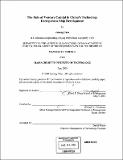| dc.contributor.advisor | Michael A. Cusumano. | en_US |
| dc.contributor.author | Chen, Juming, 1967- | en_US |
| dc.contributor.other | Massachusetts Institute of Technology. Management of Technology Program. | en_US |
| dc.coverage.spatial | a-cc--- | en_US |
| dc.date.accessioned | 2006-03-24T16:18:15Z | |
| dc.date.available | 2006-03-24T16:18:15Z | |
| dc.date.copyright | 2003 | en_US |
| dc.date.issued | 2003 | en_US |
| dc.identifier.uri | http://hdl.handle.net/1721.1/29717 | |
| dc.description | Thesis (S.M.M.O.T.)--Massachusetts Institute of Technology, Sloan School of Management, Management of Technology Program, 2003. | en_US |
| dc.description | Includes bibliographical references (p. 66-67). | en_US |
| dc.description.abstract | China has placed the commercialization of science and technology innovations as one of the nation's most important long-term development strategies. In the birthplace of venture capital (VC), venture investment has been the fuel of high technology entrepreneurship development, which transformed US economy from a manufacturing- to a knowledge-based economy. By examining the formation and operation of China's venture capital (VC) industry, this study attempts to discover the role of different types of venture capital in China's technology entrepreneurship development. Four categories of venture capital operations, government funds, government leveraged funds, State Owned Enterprise (SOE) funds, and foreign funds, are identified by their sources of funding. Four venture capital operations, NewMargin, Business Incubator of Zhongguancun Haidian Science Park, Legend Capital, and IDG Technology Venture are examined as the base of analysis. The cases are chosen because they are the leading firms in their respective categories. Case studies show that the government is not only the regulator but also an active participant in China's venture capital industry. The active involvement of the government has both positive and negative impacts on the industry, venture capital funds, and entrepreneurial firms. The government's early involvement provided seeds for China's venture capital industry, but its regulations on financial market that are skewed towards the reform of state owned enterprises suffocate the growth of the venture capital industry. The case studies indicate that the bigger the government stakes in a venture capital fund, the greater the correlation between the fund's portfolio and the country's long term technological development goals. Distinctions between US and Chinese venture capital firms are also discussed. | en_US |
| dc.description.statementofresponsibility | by Juming Chen. | en_US |
| dc.format.extent | 67 p. | en_US |
| dc.format.extent | 3459328 bytes | |
| dc.format.extent | 3459137 bytes | |
| dc.format.mimetype | application/pdf | |
| dc.format.mimetype | application/pdf | |
| dc.language.iso | eng | en_US |
| dc.publisher | Massachusetts Institute of Technology | en_US |
| dc.rights | M.I.T. theses are protected by copyright. They may be viewed from this source for any purpose, but reproduction or distribution in any format is prohibited without written permission. See provided URL for inquiries about permission. | en_US |
| dc.rights.uri | http://dspace.mit.edu/handle/1721.1/7582 | |
| dc.subject | Management of Technology Program. | en_US |
| dc.title | The role of venture capital in China's technology entrepreneurship development | en_US |
| dc.type | Thesis | en_US |
| dc.description.degree | S.M.M.O.T. | en_US |
| dc.contributor.department | Management of Technology Program. | en_US |
| dc.contributor.department | Sloan School of Management | |
| dc.identifier.oclc | 54032006 | en_US |
